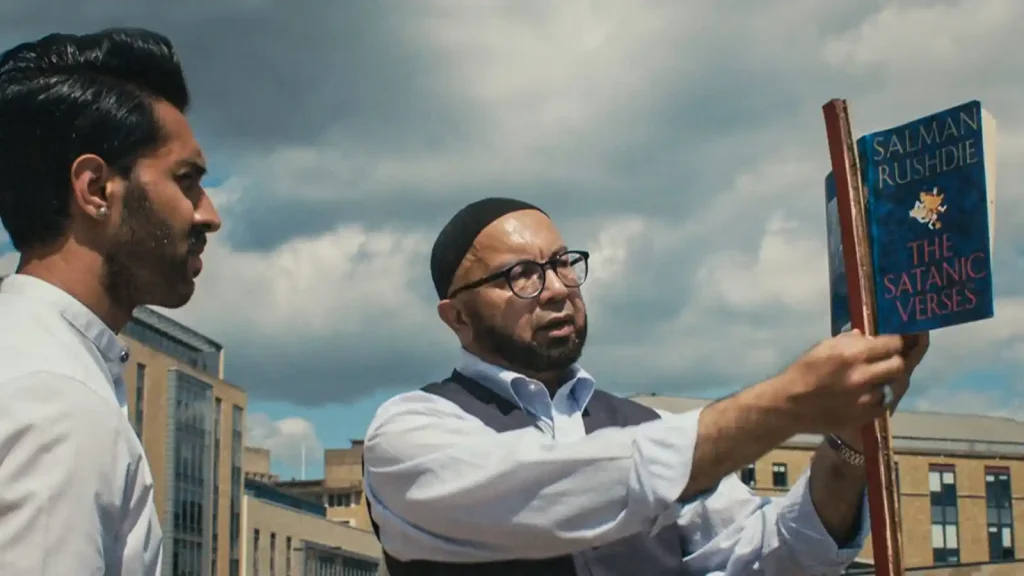The Satanic Verses: 30 Years On – In 1988, the release of Salman Rushdie’s novel The Satanic Verses ignited a profound cultural conflict in Britain, particularly among members of the Muslim community who deemed the book blasphemous. They demanded its ban, arguing that it violated the sanctity of their faith. This set the stage for a broader national debate about the boundaries of artistic freedom and the limits of free speech.
The controversy began quietly in the north of England but quickly escalated into a widespread movement, resonating throughout the UK and rippling out to the broader Islamic world. The discord reached its zenith in February 1989 when Iran’s Ayatollah Khomeini issued a fatwa, effectively a death decree, against Rushdie, marking a pivotal moment in the cultural skirmish.
Now, over three decades later, broadcaster and journalist Mobeen Azhar returns to his roots in Yorkshire, the initial epicenter of the protests, to delve into the enduring impact of The Satanic Verses. Through his documentary, “The Satanic Verses: 30 Years On,” Azhar seeks to explore and understand how the events of 1989 continue to resonate within the Muslim community and beyond.
Throughout his journey, Azhar engages with a variety of voices that echo the diverse reactions to the Rushdie Affair. He speaks with individuals who were at the forefront of the initial protests, gaining insight into their motivations and the broader implications of their actions. He also converses with a writer who, during the tumult of the book’s release, grappled with the intricate dilemmas of free expression versus religious conviction. Additionally, Azhar interviews a former member of the National Front, who reveals how the controversy served as an unexpected recruitment catalyst for their group.
Azhar’s exploration is rich and multifaceted, examining not just the immediate reactions to the book’s publication but also the long-term effects on community relations, political landscapes, and cultural dialogues in Britain. His documentary aims to provide a comprehensive analysis of how a single literary work can provoke such extensive social and political ripples, reflecting on the complexities of identity, faith, and freedom.
Through personal stories, historical analysis, and on-the-ground reporting, “The Satanic Verses: 30 Years On” offers viewers a nuanced perspective on the ongoing conversation about the limits of free speech and the responsibilities that come with it. Azhar’s work is a timely reminder of the power of words to unite or divide, to inspire dialogue or incite conflict, and serves as a crucial exploration of the balance between respecting religious sensibilities and defending the freedom of expression.
The Satanic Verses: 30 Years On – A Legacy of Controversy
In 1988, Salman Rushdie’s novel “The Satanic Verses” sparked a firestorm of controversy. The book, which explores themes of migration, identity, and faith, was deemed blasphemous by some Muslims due to its fictionalized depictions of Prophet Muhammad and early Islamic history. The following year, a fatwa – a religious decree – calling for Rushdie’s death was issued by Iran’s Supreme Leader, Ayatollah Khomeini. This event sent shockwaves through the world, placing freedom of expression in direct conflict with religious sensibilities.
Mobeen Azhar, a scholar of Islam and literature, delves into the lasting impact of “The Satanic Verses” in a new exploration titled “The Satanic Verses: 30 Years On.” This examination goes beyond the immediate outrage of 1989, analyzing the book’s continuing influence on the Muslim community, the evolution of free speech discourse, and the scars left by violence in the name of religion.
A Complex Literary Landscape
“The Satanic Verses” is a challenging novel, employing magical realism and dreamlike sequences to explore the protagonist’s struggle with faith and identity. While some Muslims took offense at specific passages, others engaged with the book’s deeper themes, sparking discussions about the role of faith in a modern world. Azhar explores these diverse reactions, highlighting the complexities within the Muslim community regarding the novel.
The Shadow of the Fatwa
The fatwa against Rushdie cast a long shadow. It forced him into hiding for years, fearing for his life. Azhar analyzes the chilling effect this event had on artistic expression, particularly for writers who dared to challenge religious orthodoxy. He explores the ongoing debate surrounding the balance between artistic freedom and respecting religious beliefs.
Beyond the Headlines
“The Satanic Verses: 30 Years On” goes beyond the sensational headlines of 1989. Azhar examines how the events surrounding the book have impacted interfaith dialogue and understanding. He explores how Muslims, particularly younger generations, grapple with the legacy of the controversy and its relevance in today’s world.
A Call for Open Dialogue
Ultimately, “The Satanic Verses: 30 Years On” advocates for open dialogue and mutual respect. By fostering understanding between different cultures and perspectives, we can avoid the violence and division that erupted in 1989. Azhar’s exploration serves as a reminder of the importance of artistic freedom and the need for open discourse on sensitive topics.
This examination offers a nuanced and timely analysis of a book that continues to spark debate. It’s a valuable resource for anyone interested in the intersection of literature, religion, and free speech in our increasingly interconnected world.
FAQ: The Satanic Verses: 30 Years On
1. What is “The Satanic Verses: 30 Years On” about?
“The Satanic Verses: 30 Years On” is a documentary that explores the lasting impact of Salman Rushdie’s controversial novel “The Satanic Verses.” It delves deeper than the initial outrage of 1989, examining the book’s influence on the Muslim community, free speech discourse, and the scars left by religious violence.
2. Why was “The Satanic Verses” so controversial?
The novel sparked controversy due to its depictions of Prophet Muhammad and early Islamic history, which some Muslims considered blasphemous. This led to protests and ultimately a fatwa issued against Rushdie by Iran’s Supreme Leader.
3. What are some of the themes explored in the documentary?
The documentary explores themes such as:
– The complex reactions within the Muslim community to the book.
– The chilling effect of the fatwa on artistic expression and free speech.
– The impact of the controversy on interfaith dialogue and understanding.
– How younger generations of Muslims grapple with the legacy of the book.
– The importance of open dialogue and mutual respect in navigating sensitive topics.
4. Who is Mobeen Azhar?
Mobeen Azhar is a scholar of Islam and literature who hosts the documentary. He delves into the events surrounding the book through interviews, historical analysis, and on-the-ground reporting.
5. Who is the target audience for “The Satanic Verses: 30 Years On”?
This documentary is relevant for anyone interested in the intersection of literature, religion, and free speech. It’s particularly valuable for those who want a deeper understanding of the “Satanic Verses” controversy and its lasting impact.




